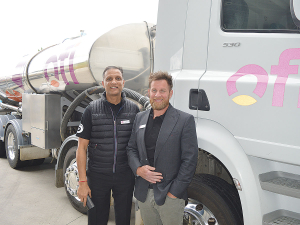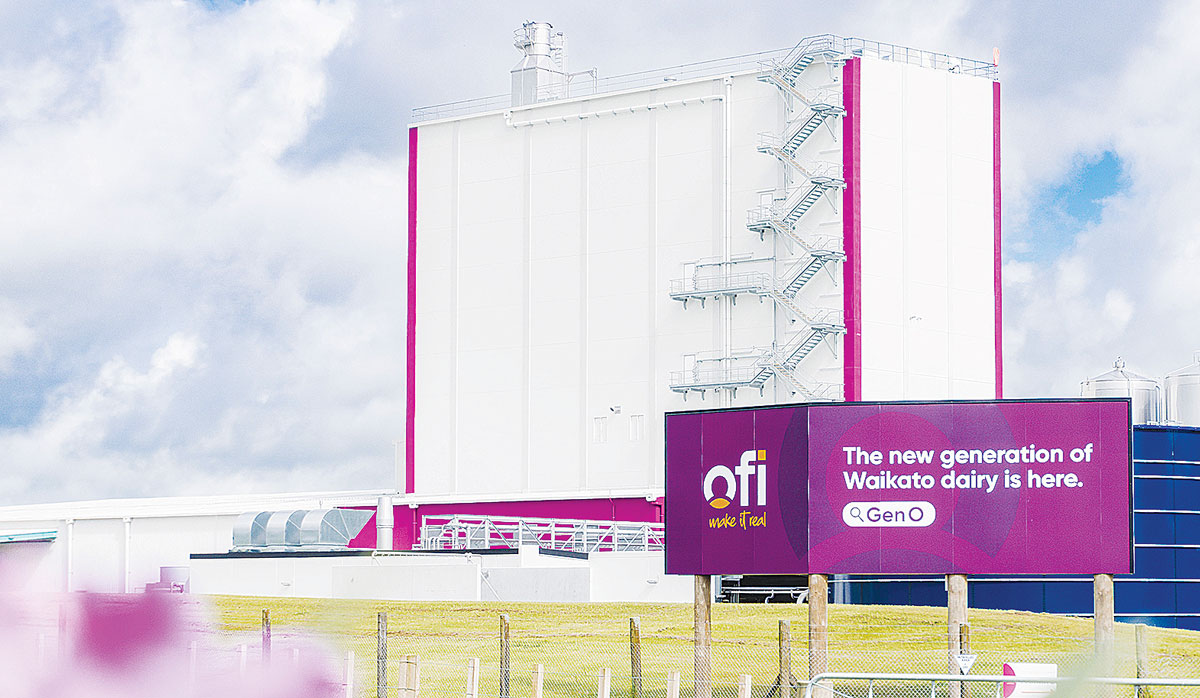Happy with ofi milk supply deal
Farmers who have switched their milk supply to the country's newest processor say they are happy with the deal they have been offered.
 ofi managing director dairy Sandeep Jain and ofi NZ general manager milk supply Paul Johnson at the new plant in Tokoroa.
ofi managing director dairy Sandeep Jain and ofi NZ general manager milk supply Paul Johnson at the new plant in Tokoroa.
The Singaporean conglomerate behind New Zealand’s newest milk processing plant says this is the first step in a long journey.
Olam food ingredients (ofi) managing director dairy Sandeep Jain told the opening of ofi’s new milk plant in Tokoroa this month that they were a “very growth-oriented company”.
“We are already committed to doubling our footprint in Tokoroa; we are committed to the community, our farmer suppliers and employees,” he says.
Three years ago, ofi, a new operating group of Olam, decided to build a milk plant in New Zealand. Jain says they were encouraged by the confidence shown in them by the South Waikato District Council and farmers.
“This made us realise that we were doing the right thing,” he says.
The new plant is producing whole milk powder to meet growing demand, targeting key global customer applications in dessert, bakery, beverage, and confectionery categories.
Jain says the new plant will become part of a global network that spans major milk consumption markets, such as South-East Asia, China, the Middle East, and Africa.
“Opening our new plant in the heart of New Zealand’s dairy region allows us to meet growing demand from our global customer base for high quality, New Zealand- made dairy ingredients and shows our commitment to exploring growth opportunities in our dairy product offerings, focused on valueadded capabilities within our portfolio,” Jain says.
“The plant will become part of our global network that spans major milk consumption markets including South-East Asia, the Middle East, and Africa, complementing our existing global footprint, driving greater collaboration with our customers and helping us achieve our purpose to be the change for good food and a healthy future.”
The company has signed farmers based within 60km of the factory. Paul Rennie, ofi operations director, says the positive response from local farmers and the community has been a humbling experience.
“The enthusiastic response we’ve received from local farmers tells us our partnership approach, and ofi’s global reputation as a leading dairy ingredients provider and innovator, has struck a chord with them,” Rennie says.
“Right from the start, our approach has always been to listen to what farmers want in a milk supply partner so we could tailor our offer accordingly. They told us they want a business partner who brings them confidence, certainty and cash flow, and hands-on solutions to the everyday challenges they face.”
Alongside an attractive milk price offer, ofi has also found innovative ways to support its farmer partners, with a focus on sustainability.
 |
|---|
|
The new plant at Tokoroa took two years to complete. |
This includes coinvestment in advanced tools and technology to help ofi farmers actively monitor their environmental impact and achieve meaningful on-farm emissions reductions.
Construction of ofi’s state-of-the-art milk processing plant in Tokoroa, South Waikato, took two years and was completed in August. The first milk powder was produced at the new Tokoroa plant in August and the first shipment was exported in September. The plant employs 60 people, with 80% from Tokoroa.
Olam is no stranger to the NZ dairy industry. Olam held a cornerstone stake in the country’s second largest milk processor, Open Country Dairy, before offloading it to Talley’s Group, who now own Open Country.
The company says the new facility also complements ofi’s existing global footprint, driving stronger partnerships with its customers and strengthening its co-creation capabilities across the region.
The next stage of investment will see further capability added to the facility to develop high value dairy ingredients, expanding the range of ofi’s offering. It will also enable ofi to look at ways to grow the value of its milk, generating better returns for its farmer partners while delivering on its ambition to produce ingredients in a way that is socially responsible and environmentally sustainable.
Sustainability is Key
Sustainability is a core focus for ofi and is at the heart of everything it does, the company says.
A biomass boiler fuelled by sustainably sourced wood residue expected to be commissioned in Q1 2024 will power the plant enabling milk processing to be energy efficient and low impact.
In October, ofi published its first sustainability strategy for its dairy business, Dairy Tracks, which outlines the detailed approach the company is taking with sustainability efforts across its value chain.
The report shares how the company will meet industry challenges head on, providing direct support to its farmer partners to help them meet their goals to become more socially and environmentally sustainable by 2030.
AtSource, ofi’s sustainability insights platform, links ofi farmers’ environmental plans, greenhouse gas emissions and nutrient reports to its global customers to provide transparency across the supply chain.
ofi is pioneering a new animal feed trial that could help dairy farmers replace costlier and environmentally intensive feeds with a sustainable, forward-thinking alternative. It aims to repurpose almond hulls and shells – a by-product from its Australian orchards into a nutritious feed for dairy cows – to help cut farmers’ methane emissions and lower their input costs and reduce waste in ofi’s almond business.
Paul Rennie, ofi operations director, says all aspects of ofi’s new plant are designed to maximise renewable energy use, minimise pollution and water use and ensure waste is handled in the most sustainable way possible.
“We will invest in a biomass boiler fuelled by wood residue sourced from local forests to power the factory, ensuring milk processing is energy efficient and with a low environmental impact,” he says.
“Treated waste-water from milk processing operations will be re-purposed in an on-site nursery to grow cost-price native plants to help our farmers with riparian planting.”
Registrations are now open for the 2026 Ruralco Golf Classic, with all proceeds from the event set to support the Mid Canterbury Rural Support Trust.
Mating wrapped up last month at the across-breed Beef Progeny Test on Pāmu’s Kepler Farm in Manapouri.
Libby Judson is a keeper of memories from an age gone by. Tim Fulton tells her story.
A New Zealand-first native tree study has highlighted the Bioeconomy Science Institute's position as a forestry research leader.
Hemp fibre processor Rubisco is relocating its core processing facility to Ashburton as part of a $20-$30 million expansion to leverage what it says is an accelerating global demand for sustainable and renewable fibres.
Tradition meets some of the latest in technology at the 2026 East Coast Farming Expo.
President Donald Trump’s decision to impose tariffs on imports into the US is doing good things for global trade, according…
Seen a giant cheese roll rolling along Southland’s roads?